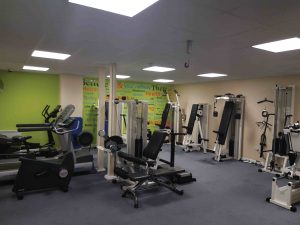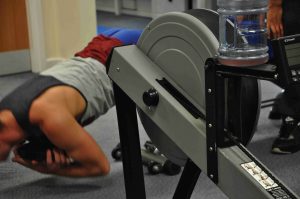Fitness For The Less Fortunate
Fitness For The Less Fortunate
Share
Most of us take our fitness habits for granted, but what about those less fortunate? Here, we meet a charity
helping the homeless and disadvantaged get healthy…
 Some of you might consider your gym membership a big expense. However, for others, the idea of being well or keeping fit is a mere pipedream.
Some of you might consider your gym membership a big expense. However, for others, the idea of being well or keeping fit is a mere pipedream.
The nation’s homeless or vulnerable can only imagine what it’s4 like being able to eat healthily or train on a regular basis, but there is a charity in North Devon doing their best to help them. Freedom Community Alliance is a social action charity base with a range of support services. Their fitness work is part of a Big Lottery funded project called Bridging the Gap, which provides services seemingly neglected by a reducing public sector, especially in the areas of health, homelessness and benefits changes.
“We often see people who are socially excluded and suffering from either poverty, poor mental and physical health, drug or alcohol misuse, offending behaviour, insecurely housed or homeless or long-term unemployed, and sometimes with a combination of these issues leading to additional complexities,” explains Rebecca Harris, Bridging the Gap Manager.
The project was originally set up in around 2000 in response to a street homeless and addiction problem identified by local churches. They decided to provide a soup kitchen one day a month and were surprised with the demand. The people using these facilities then started asking for help with other problems and the service grew. By 2008, the project had become large enough to become its own stand-alone charity, providing services including addiction treatment and rehabilitation, supported housing, social enterprise and an open access day centre, where the fitness and healthy eating now form part of the project.
“We are aware that keeping fit has a positive effect on mental health
and the idea of providing a fitness facility grew from there,” continues Harris. “Potential members have a health assessment and induction and, when we are certain they are fit enough to train, they have a personal plan drawn up. This also includes a simple baseline fitness test, so
we are able to track their progress and offer them the encouragement to continue.”
 Freedom Fitness essentially consists of a gym with a selection of weight machines, free weights (including a Jones Machine, which was the result of a very generous donation) and some cardio machines.
Freedom Fitness essentially consists of a gym with a selection of weight machines, free weights (including a Jones Machine, which was the result of a very generous donation) and some cardio machines.
“Freedom Fitness is run by our personal trainer, Drew, who is great at creating a community within that environment. He has a long list of qualifications and is passionate about helping people to reach their fitness goals – whether to lose weight, increase fitness or to put on muscle weight.
“Following a successful induction, each new member will have a personal training plan based on their health, ability and fitness goals. For some that might be losing weight, for others it will be fitness or building strength or muscle. Flexibility training based floor exercises are also recommended for some.”
As well as fitness support, users also get a free three-course meal. Many of the people who use the meal service are on low (or sometimes no) incomes and are unable to afford to buy food. Consequently, many miss meals or buy poor quality, cheap food in order to pay bills and debts. “The meals are a balance of fresh vegetables, fruit, proteins and carbohydrates, so every person is getting a contribution to their daily nutritional needs,” says Harris. “Food donations from supportive companies and the public are essential to this service. The skill is taking whatever ingredients we have and creating an appetizing and nutritious menu five days a week!
“We are also able to provide small food parcels and ‘take-aways’ for some people and work closely with the local food bank who gives out larger quantities of food, depending on the individual’s situation.”
Every person’s story or background is different. “The most common challenges we face are around the areas of commitment to an exercise regime and understanding risk, either to themselves or others. Most individuals we support have health issues of some kind related to age, lifestyle or disability, and many are long-term unemployed, which can present problems with training in the gym. To mitigate this, we have strong procedures to ensure that everyone who uses the gym is safe and able to do so.
“A high percentage of people we support have lives which can be chaotic or unpredictable due to the complex mix of their needs. For example, low incomes, unsafe housing and poor mental health can bring many challenges on a daily basis – more so now with the recent welfare reforms, and attending the gym can get pushed down the priority. However, for some, it is their safe place and helps to keep them balanced and focused. We know that exercise builds self-esteem, confidence and well-being and contributes to good mental as well as physical health.
For those living in the midst of a life-controlling addiction, we have to ensure they understand that it is not safe to use the gym when under the influence of a mood-altering substance of any kind (including legal highs). Addiction of any kind can bring other health challenges, such as blood borne viruses (BBV’s), ulcers and lesions, etc, which all need to be taken into consideration. We have a few older people (65+) who like to use the fitness room on a regular basis, and for them, having access to a closed session makes all the difference.”
Here’s hoping others join the crusade and help those who need it most.
For more information, visit www.freedomcommunityalliance.org.uk





















FOLLOW BESTFIT